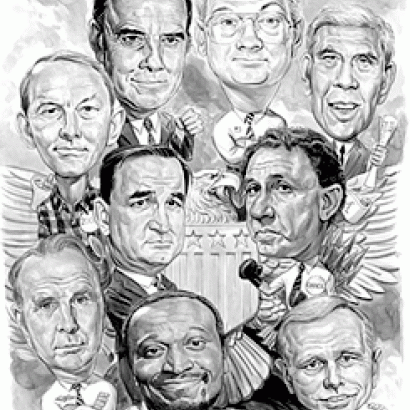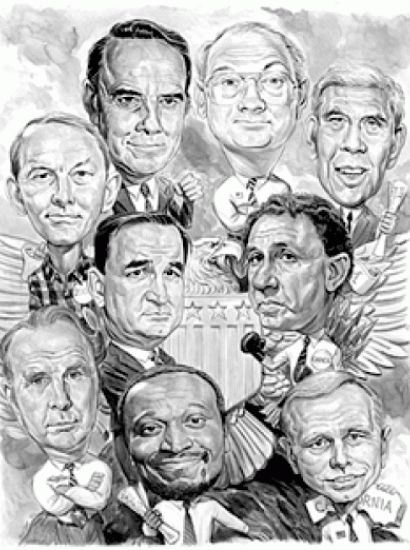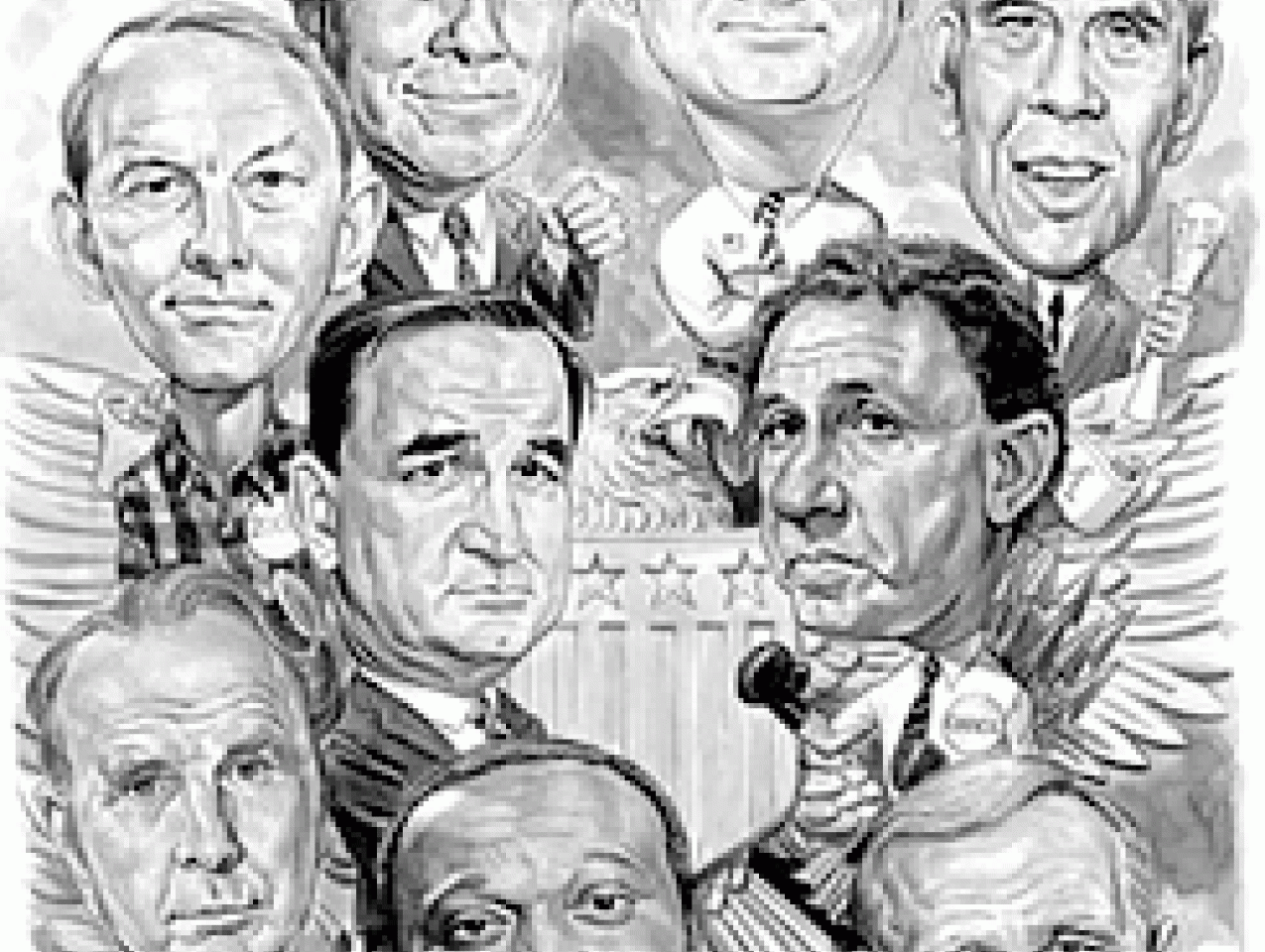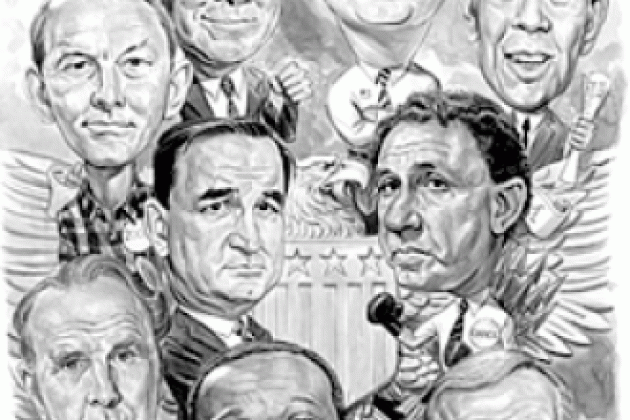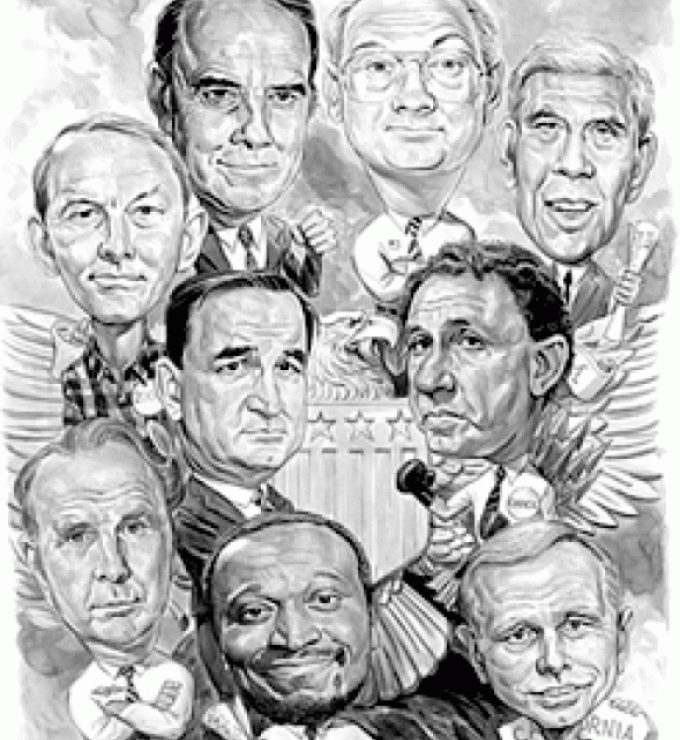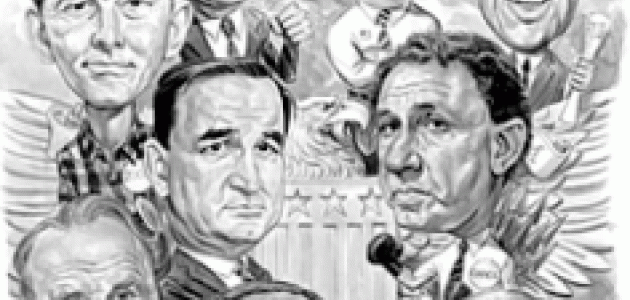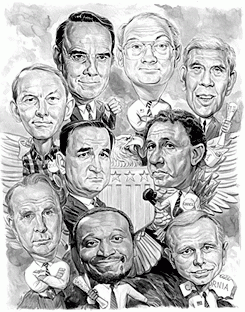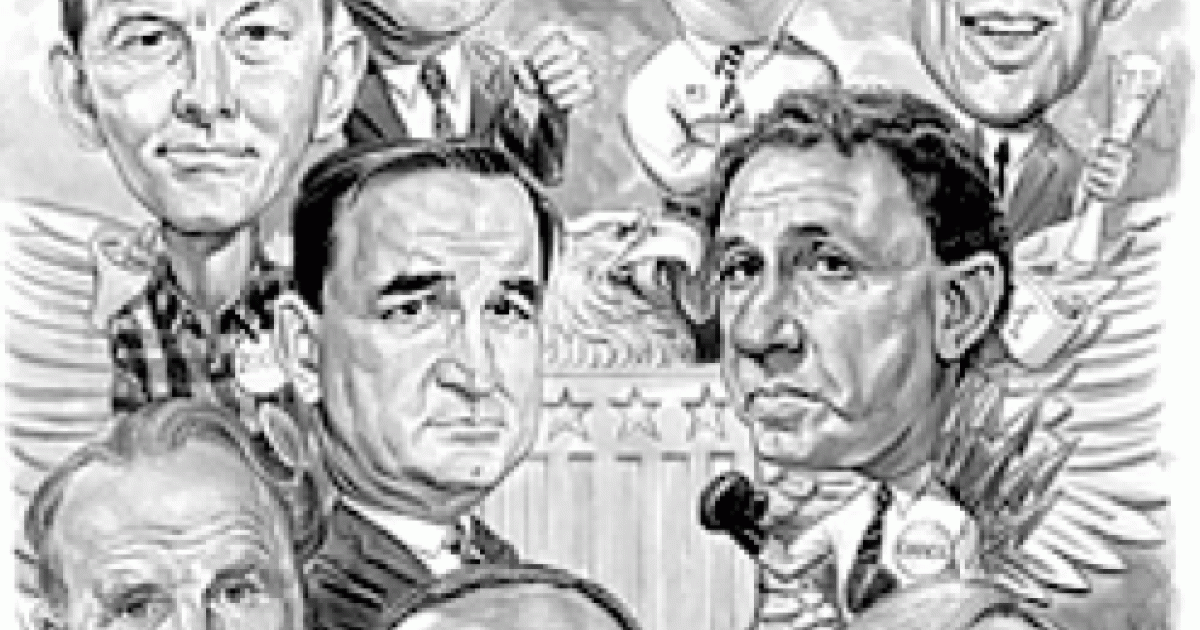- Campaigns & Elections
- The Presidency
- Politics, Institutions, and Public Opinion
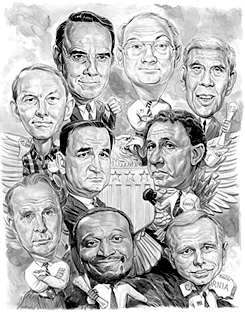
Daniel Casse on Lamar Alexander
Paul Gottfried on Patrick Buchanan
William E. Dannemeyer on Bob Dornan
Mary Parker Lewis on Alan Keyes
Roger J. Stone Jr. on Arlen Specter
David Kuo on Bob Dole
Lewis E. Lehrman on Phil Gramm
Mitchell E. Daniels Jr. on Richard Lugar
Martin Anderson on Pete Wilson
Lamar Alexander is an unorthodox, populist, and persuasive Republican leader. That is why I gladly moved from Washington to Nashville to work on his presidential campaign, and why I believe he will be the party's nominee in 1996.
Our legislative branch's leadership of national government is a temporary (albeit fascinating) phenomenon. But we need our next president to set the agenda, not take his cues from Congress. Conservatives should be looking for a candidate who can present a bold design for government along with the ability to execute it.
Lamar Alexander has the imagination, energy, and executive background to do both. The major themes of his campaign-growth, freedom, and personal responsibility-are indisputably conservative. But what distinguishes him is his unorthodox approach to politics, his populist style of governance, and his skills of persuasion.
Unorthodox. In 1978, Alexander was elected governor of Tennessee, only the third Republican to win that office this century. Nothing that followed was typical, either. He began his crusade to improve Tennessee's pitiful public-school system by introducing merit pay and master teachers, relatively radical notions that weakened the teacher unions. The National Education Association fought him vigorously. He ignored warnings that it was hopeless, fought back, and won.
Alexander broke new ground on other issues. At a time when most governors were using state airplanes to fly to Washington, Alexander closed Tennessee's D.C. office altogether. He chided other governors for behaving like senators. As early as 1981, he advised President Reagan to end the federal role in education. Four years later, he called two relatively unknown congressmen named Newt Gingrich and Trent Lott and invited them to join a small group of GOP governors to plot a united strategy for second stage of the Reagan Revolution.
He showed the same verve when he arrived at the Department of Education in 1991. By then, the intellectual excitement of the Bill Bennett years had passed, and the Bush administration's school-choice agenda amounted to little more than photo-ops with local education activists. Alexander understood that school choice-despised by country-club Republicans and misunderstood by most suburbanites-was at risk of becoming a political loser. His "America 2000" program was a true grass-roots initiative that breathed life into education reform. Conventional wisdom dubbed it a quirky agenda that offered little federal legislation. But it tapped into a decentralization movement that remains the only path to school choice. His 1992 school-choice bill was a true voucher program for public, private, and parochial schools, but the Democrats in Congress made sure it never came to a vote.
Populist. Alexander's well-publicized assault on Congress-"cut their pay and send them home"-is no mere slogan. It reveals his deep sympathy with the populism that has justifiably become the bedrock of conservative politics. An unapologetic champion of term limits, he sincerely believes that a citizen legislature would transform the character of the federal government. With none of Ross Perot's demagoguery, Alexander offers a mature, but no less revolutionary, brand of popular discontent with government in Washington.
While some Republicans still waver on the wisdom of block grants, Alexander is advancing the idea both philosophically and practically. He suggests ending the federal role in education, welfare, and job training altogether. He applauded the Supreme Court decision striking down the 1990 Gun-Free Schools Zone Act, an attempt to federalize local responsibility that every GOP senator supported. "We know what to do" is the central tenet of his populist conservative political theory, which holds that Americans should be given the freedom to make decisions about their own lives. Although every Republican will offer bromides about "states' rights" or "new federalism" during the coming months, Alexander's own policy prescriptions suggest a fully conceived populist vision.
Persuasive. If conservatives are to remake government, we must do more than merely express support for conservative ideas. We must also win over others not fully in our camp. It didn't take much leadership to point out that the Clinton health-care plan was a socialistic fantasy. The political challenge was to convince half the nation-including many Democrats-that the Clinton plan was bad medicine.
The job of president is almost entirely about setting a principled agenda and then persuading the country of its wisdom. Alexander's public career has prepared him to do just that. As governor, he led a Democratic legislature toward his goals. When 38 governors competed to get GM's Saturn division to build its plant in their states, Tennessee won, in part because Alexander convinced the company's executives that a right-to-work state with school choice, merit pay, and no income tax was the best environment for business. No tax breaks were involved.
As the chairman of the National Governors Association, he transformed its agenda by convincing fellow members-including Bill Clinton, John Sununu, Dick Thornburgh, and Michael Dukakis-that they should end their obsession with Washington issues and focus on state matters instead.
A president who is at once unorthodox, populist, and persuasive will quickly establish a very different type of presidency. But that is exactly what conservatives and libertarians should be looking for next year.The danger we face is that, with an irreparably damaged president in the White House, Republicans will try to coast to victory in 1996 on a poll-driven platform of GOP boilerplate. Alexander will offer none of that blandness. He governed Tennessee in the 1980s in much the same way that Wisconsin's Tommy Thompson and Michigan's John Engler govern in the 1990s. True, his view of the role of the federal government may be at odds with much of established Washington. But it is a view understood and applauded around the country.
T he announcement by Pat Buchanan of his candidacy for the Republican presidential nomination has done more to change the Republican race than has the entry of any other candidate. More than any other contender, Buchanan represents the populist right and has fought all of its enemies. He has tangled with the liberal media; the gay, feminist, and civil-rights lobbies; and the corporate economic interests allied with big government. He has also dished out, in his provocative speeches and blistering columns, fully as much as he has taken. There is a certain bulldog tenacity about him that even his bitterest opponents acknowledge. When Buchanan believes he has been unfairly attacked, he stands his ground, and he shows as much civility or incivility to his critics as they display toward him. In 1992, I thought that he should have done more to defuse accusations of being anti-Jewish, a charge that plagued him particularly after he had linked support for the Gulf War to the activities of Israel's "amen corner." But Buchanan would not apologize for what he--and others, including commentators Michael Kinsley and Rabbi Jacob Neusner-took to be a false charge. As he told his Jewish advisers, he would not dignify a "libel" charge by responding to it.
No, I do not always agree with Buchanan's positions, but they are honestly stated and consistently held. Unlike senators Gramm and Dole, he has not waffled on affirmative action or aid to illegal aliens, which Buchanan has always opposed. And like Alan Keyes, but unlike most of the other Republican candidates, he is genuinely opposed to abortion.
Equally important to me are the populist themes that resonate in his campaigns. In the Wall Street Journal in 1993, Irving Kristol predicted the inevitable success of a national leader carrying out Buchanan's ideas. Buchanan's passionate concerns-violent crime, immigration controls, the disintegration of morals, and the disappearing jobs of American workers-are now, according to Kristol, widely shared. New York cabdrivers, even those from the Third World, express most of these concerns with equal vehemence. Kristol is no friend of Buchanan or his candidacy, but he does recognize the timeliness of his populist themes-and the foolishness of those who would resist them.
Buchanan belongs to a movement that is also sweeping Europe. In Italy, Austria, and Germany, there is a surging populist protest against capricious public administration. There is also a growing demand that government bring itself into line with the beliefs and traditions of those it is intended to serve. Democracy, populists maintain, is not an exercise in sensitivity training or the formulation of administrative policy. It is the practice of self-government by self-identified communities, whether regional or national.
When the popular will seeks to affirm traditional morality or limit the political community, but is disregarded or overruled judicially, then both democracy and citizenship are devalued. This is now a regular occurrence in the U.S. The populist call for both political accountability and true self-government has joined a conservative goal: the defense of family and traditional communities endangered by a therapeutic managerial state.
Buchanan personifies the populist revolt against this. Unlike neoconservatives and gentrified Republicans, he concedes nothing, rhetorically or programmatically. He calls for seismic change: devolution of power to states and open confrontation with moral and cultural revolutionaries posing as value-free judges or public servants. As president, he would not merely dicker with liberal administrators. He would find ways to dispatch them and, wherever possible, dismantle their agencies.
Buchanan's spiritedness and unwavering conviction persuade me that he would make a difference as president. Unlike Ronald Reagan, he would not leave the Washington power structure as he found it. He would make strenuous efforts to restore the dual federalism established by our founders.
Buchanan knows that genuine democracy must come from below. It cannot be mandated from Washington or, in imperialist fashion, imposed abroad. In our own country, democracy is an ideal to be recaptured, not a blueprint to be forced on other nations.
I doubt that Buchanan would be a rigidly isolationist president. His stern warnings against foreign entanglements have a constructive aim. He rightly fears that our own society is deteriorating in many ways. Especially now that our communist enemy is gone, it may be best to work on domestic problems instead of shouldering the burdens of other peoples.
Nor should we encourage unskilled workers from less developed lands to immigrate, take advantage of our social services, and displace those most at risk in our own work force. America, as Buchanan sees it, should hope neither to remake nor to absorb the rest of humanity. In contrast to the nationalism expressed by Ben Wattenberg, one of his frequent debating partners, Buchanan's nationalism has no global imperative and is respectful of cultural differences. Because of his feisty and principled character and his democratic counterrevolutionary vision, I shall cast my own vote in the Republican presidential primary for this modest nationalist.
T he elections of November 1994 did more than usher in the first conservative Congress in two generations. They also signaled the public affirmation of a conservative agenda. In so doing, they forced conservatives to change both their congressional and their presidential perspectives. Suddenly, long-held conservative hopes became new-found conservative realities. The balanced budget is fashionable-the only real question now is whether it will be accomplished through the budget process or through an amendment to the Constitution. Federalism is renewed and devolution is the new buzzword. Illegitimacy is bad and the family needs to be strengthened. As conservatives consider whom among the presidential candidates to support in 1996, the question is, "Who is best suited to take us to the next stage of our conservative realignment?" The clear answer: Bob Dole.
The next stage of the realignment is not for communication and symbolism, but for the detailed work of devolving federal power, strengthening families, and reasserting American interests abroad. It is a stage for implementing an agenda already defined.
Although some things may have caused conservatives some angst, the simple fact remains: On every serious issue on our agenda, Bob Dole is not only on board, he is the leader.
This is not a recent phenomenon. The man now calling for the abolition of the departments of Commerce, Housing and Urban Development, Education, and Energy is the same man who voted against creating both Education and HUD. The man now speaking out against our nation's social pathologies has a pro-life voting record of nearly 100 percent. The man now advocating a U.S. foreign policy based on American interests has been one of the leading voices in foreign policy for years. And the man who has pledged to balance the budget has made tough choices, year after year, on spending cuts.
Today, Bob Dole is arguably the most respected statesman in the country. He has proven himself an excellent strategist who remains cool under fire, a coalition-builder, and a political achiever. He has demonstrated both the courage and the decisiveness that will be required to implement our agenda.
Too often, conservatives have belittled and diminished legislative experience as a liability-suggesting that a man who legislates cannot be trusted with the ideological mantle. But as Ronald Reagan, George Bush, and even Bill Clinton have learned, accomplishing-legislating-is difficult business. Any agenda, however aggressive, however bold, however visionary is merely an agenda unless it is implemented. But Majority Leader Dole is not only a legislator, he is a master at getting things done. And President Dole would be able to translate his experience and ability into the tough work of reversing 30 years of growth in the welfare state.
Many contend that the president's most important role is commander-in-chief of our armed forces, and they may be right. Though Cold War pressures have receded, our recent dalliances in Somalia, Bosnia, and North Korea testify to the continuing need for serious and responsive leadership. Bob Dole, who has emerged as the leading Republican voice in foreign policy, would bring to the presidency a developed view of world affairs. His view combines two things: an expansive interpretation of America's role in the world and a personal and pragmatic understanding of the dangers of global involvement.
For someone who has worked for both the National Right-to-Life Committee and Empower America, all of these things are important. But the real source of my attraction to Dole lies elsewhere. The true reason I believe Bob Dole should be president of the United States stems from his character.
The presidency helps define the character of the country. People look to the president for leadership, inspiration, and guidance. The president should be someone to whom parents can point and tell their children, "Be like him." In Bob Dole, parents could point to someone who served his country in war, overcame physical infirmities thought to be insurmountable, and dedicated his life to serving the American people-all good and noble things. He has also proven himself to be a man who keeps his word.
In the 1980s, following a decade of turmoil and the "malaise" presidency, America needed a particular kind of conservatism-an inspiring conservatism of sweeping visions, a conservatism that could hasten the downfall of communism abroad and the restoration of confidence at home. In President Reagan, it had an unparalleled leader. But America now needs something very different. It needs a conservatism that is still visionary, but one whose greatest virtue is belief in community and responsibility. In Bob Dole it has its rightful leader. His presidency would not only bury the aberration that is the Clinton presidency, but would also consolidate the conservative revolution.
T rue leadership emanates from men who say the right thing at the right time to the people who need to hear it most. This is how I think of Bob Dornan. In my mind's eye I return to 1990, on a typically hot and humid July morning in Washington, D.C., where a not-so-typical debate began to boil on the floor of the House.
At issue was the expulsion of Representative Barney Frank, who had brought shame upon our institution for misjudgments involving a male friend and prostitute over an 18-month period. As the sponsor of the resolution to expel Frank, I can tell you that the experience was one of the most intensely sobering dramas with which I was ever involved in my 14 years of service in the House. It was not a time for the timid. Only four members spoke in favor of the expulsion. Bob Dornan was one of them.
Bob began his comments, "I have not been this nervous in this well in over a 14-year span in this House." And then he did something that has become trademark Dornan, something only courageous men can do under fire.
Knowing that he stood virtually alone, knowing that ridicule and contempt would be heaped upon him by Frank's defenders and a vicious liberal media, Bob turned and looked Barney Frank square in the eyes, not once turning his attention elsewhere, and said what had to be said to the man who needed to hear it most: "I don't care about the details. The devil is in the details. That is for you lawyers.Ö I will vote for expelling you because you did not have the honor or decency to resign."
Bob Dole, as inspirational as his life has been, would never have shown such leadership. Phil Gramm would have become invisible. Dick Lugar would have prayed that the moment would quickly pass. And Arlen Specter would have defended Frank. Under those circumstances, not one of these Republican candidates, who all serve in elective office, would have done what needed to be done or have said what needed to be said. This is a major reason why I support Bob Dornan for president.
Bob's conservatism is real. It is passionate. And it is based on a deep and abiding faith in God. I was glad, although not surprised, to hear Bob inject themes of liberty and virtue into the presidential debate. Unlike the congressional colleagues who have become his presidential competitors, Bob actually understands the historical, moral, and philosophical basis of these themes. He knows, and has stated, that we cannot be a free people unless we are a virtuous people. He did not need million-dollar handlers to tell him that. Nor did he need the incessant prodding of pro-family special interests to motivate his comments. He knows the relationship of liberty to virtue because he is a self-motivated student of truth.
History is one of Bob's closest friends. His life-long relationship with history has honed his bubbling idealism into a practical and balanced conservative philosophy. As a staunch proponent of lower taxes and lower federal spending, Bob knows the bounds of governmental authority, not only because he has worn this mantle of authority over the last 18 years in Congress but also because he has studiously examined history. From ancient Rome to modern America, Bob Dornan knows what makes nations rise and fall. The presidential rivals who serve with him in Congress haven't got a clue.
Bob Dornan is not the only good conservative in this race for the presidency. Pat Buchanan and Alan Keyes are also running-and I count each as my friend. Even so, when I have to choose, it is Bob Dornan I will support. Few other qualities in a presidential candidate could offset a lack of elected public service. Bob has been elected to Congress nine times, in Democratic districts. These experiences have built character that cannot be found anywhere else in politics.Moreover, Bob's record of service both in and on behalf of the military is a nearly essential requirement of the role of commander-in-chief. I know Bob feels it is an absolute requirement. Through a variety of circumstances, he has witnessed firsthand how America has influenced the world for good and has developed the deepest appreciation for U.S. sovereignty. Bob Dornan would not rush us off to war, nor would he abandon genuine freedom fighters anywhere in the world. In determining this delicate balance, I know he would excel-always erring on the cautious side in preserving American lives and sovereignty.
Bob Dornan belies the public persona crafted and manipulated by an adversarial media elite. His passion for life, his love of country, his deep commitment to his wife Sallie and their children and grandchildren, and his uncanny identification with all types of people sometimes make him an easy target for mean-spirited and shallow adversaries. Yet he has remained eternally optimistic about life and about the future of America specifically. Great men deserve even greater opportunities to show their mettle. This is why I unhesitatingly support Bob Dornan for president of the United States of America.
W ho is the authentic heir of the Reagan Revolution, the iron man who can fulfill its promise? Who among us is the leader with the compelling vision, the experience, and the perseverance to lead us out of our time of troubles? I say I know such a man.
Born a son of the South, a grandson of Yankee immigrants, raised in Georgia, and grown to manhood in Texas, he has risen to leadership by virtue of his own remarkable energy and intelligence-just as he rose to the rank of legislative statesman as the senior senator from Texas. Phil Gramm is the man.
Born poor, self-made, and unencumbered by the cultural baggage of country-club Republicans, Phil Gramm's life has demonstrated the promise of the American dream: that every American, no matter how humble his beginnings, has the right and the opportunity to rise by indefatigable effort and indisputable merit as high as he might go. Phil Gramm will rise to the highest office in the land because he will, conventional wisdom notwithstanding, roll up the primaries in 1996. And he will win the general election going away.
This is how Phil Gramm will win! He will win with the most compelling campaign of conservative ideas. He knows what he believes and loves what he knows. He will win by recruiting legions of true conservative activists to embrace his definition of the American dream. He will win by the sheer force of his superior talent and leadership, which explains why he has built more organization, raised more money, and won over the vast majority of conservative activists who know where he stands.
Every true conservative who aspires to the highest office should uphold a clear program of reform designed to restore our limited constitutional government. Yet we know, from the failures and disappointments of the past, that a program by itself is not sufficient. Neither will it be sufficient in 1996 to choose careerism or time-serving political credentials.
The conservatives now assembled for victory have learned from hard experience that the man who leads us will only be sufficient unto the task if he has, in addition to the gift of intellect and a well-laid plan, something more. That something is true grit, unimpeachable character, and the irrefragable tenacity to carry his plan for a rebirth of the American dream to total triumph. We the people want a president of the United States whose impeccable conservative ideas and matchless record are joined with a driving will to win. We want a winner, a big winner, a man with a strategy for victory.
In the domain of political economy, Phil Gramm is the best-trained, best-equipped presidential candidate in American history. A free-market professor of economics long before it was trendy, a co-author of the Reagan economic program, he is the very apostle of low tax rates, a balanced budget, stable money, and a deregulated economy. Phil Gramm is without peer in his grasp of how to create full employment, long-term interest rates of 4 percent, and a tax code based on a flat rate.
In the domain of defense policy, Phil Gramm has prepared himself for the post-communist world. He has declared that he is "ready for a world where the lion will lie down with the lamb, and if such a world comes about, I want the United States of America to be that lion." No other policy is acceptable to Phil Gramm, whose presidential inaugural oath, registered in heaven, will require him to "preserve, protect, and defend the Constitution of the United States of America."
Believing as I do that economics and foreign policy are contingent, but cultural and social principles are central, what assurance does one have that President Gramm will encourage and foster the indispensable moral reformation of the public square? Speaking in May before Liberty University and The Heritage Foundation, Phil Gramm said: "Faith and family produced the values and virtues that helped make America the world's greatest and most powerful nation long before we had any of the trappings of greatness and power." Quoting Alexis de Tocqueville, Gramm said, "'Not until I went into the churches of America, and heard her pulpits flame with righteousness did I understand the secret of her genius and power. America is great because she is good, and if America ever ceased to be good, America will cease to be great.' I believe that Alexis de Tocqueville was right 160 years ago, and I believe he is right today."
In more specific terms, Gramm has argued that "the social-security net that we erected has become a hammock. Government programsÖhave changed the way we behave, corrupted our values, and diminished our virtue. As we look more and more towards Caesar to take care of us, we have turned more and more away from family and faith. In rendering unto Caesar, we have stopped rendering unto God."
And thus we are brought to consider the soul of the Republican Party as we debate its presidential nomination. During the greatest crisis of American history, the Republican Party of the United States was founded on the everlasting covenant of "free soil, free men, and free labor." And with the victory of our party and of President Lincoln came vindication of the inalienable right to liberty and the end of slavery in America. More than a century later, the Republican Party of Ronald Reagan came to stand for many things, but there was one unique covenant in the platforms of 1980 and 1984. Let us call it the one needful thing. And what is that thing? Senator Gramm described "the day when all unborn children are welcomed into life and loved when they get here." A Republican Party-indeed, a Republican president-without a commitment to the inalienable right to life, without unequivocal opposition to abortion, is as unthinkable as a Republican Party without Lincoln, the inalienable right to liberty, and unequivocal opposition to slavery.
We conservatives know that, after this imminent contest for the presidency, our philosophical agenda entails no less than the comprehensive reformation of our political institutions. But to pursue a goal without the right man and the right means to attain it is to court political disaster. Republicans are blessed with several authentic candidates. But I believe that Phil Gramm is the only leader with the intellect, the force of will, and the preparation for greatness who can marshall our forces for an overwhelming and irreversible victory over our foes.
F or the millions of Americans who are brokenhearted over the decay of moral standards, the disintegration of families and neighborhoods, and the slaughter of innocents in the womb, Alan Keyes is the most powerful spokesman on the scene today. More than any other candidate, Alan Keyes offers a healing message of hope and renewal, based on the immortal principles of our great Declaration of Independence, and delivered without apology to the better angels of our nature.
The former president of Citizens Against Government Waste, Alan Keyes offers credentials second to none as a champion of Americans fed up with overtaxation, overspending, and overregulation. For example, when many Republican leaders were assuring us that Dick Darman's 1990 budget deal was a winner for George Bush and the GOP, Alan warned that the agreement would prove disastrous for taxpayers, the economy, and the party. Events proved him right.
Today the GOP endorses the policies of tax reduction, spending restraint, and local empowerment that Alan has championed for years. That is well and good. But as Alan eloquently reminds Republican audiences, economics is not at the heart of what ails America. Serious though they are, our economic problems are largely derivative, the consequences of having abandoned the moral and constitutional principles of the American founding. The transfer state is bankrupting America, but the transfer state comes into its own only when hordes of people see nothing wrong with living off the toil of others. In any event, moral vices produce the social problems for which government programs are inevitably proffered as solutions.
That's why Alan's front-and-center emphasis on moral issues is the only genuinely practical approach. Consider these words from his February 19 address to the New Hampshire Republican State Committee: "Why is it that we spend so much money on welfare and illegitimacy? Why is it that we spend so much money on crime and violence in our streets? Why is it even that we spend so much money dealing with the problems of irresponsible behavior that contribute to the decline of the health of this nation? I think you all know in your hearts what the real answer is. We don't have money problems, we have moral problems. And it's time we stood up and faced that truth." We will never succeed in relimiting the federal government until we restore the family to its rightful place as the first and best "welfare provider" and strengthen the marriage-based, two-parent family as the fundamental moral unit of society.
Of all the policies eroding the moral foundations of family life and American freedom, the policy of abortion on demand poses the greatest danger. There are, of course, many decent people on both sides of the abortion controversy. Nonetheless, the pro-abortion position is anti-family. As an institution, the family both depends upon and nurtures an ethic of duty and self-sacrifice. But the pro-abortion position fosters an ethic of self-indulgence. It says, in effect, that the convenience or pleasure of the adult is the supreme law.
Worse, the pro-abortion position implicitly justifies political despotism. The Declaration of Independence proclaims the right to life to be a gift from God and, therefore, inalienable. The pro-abortion argument assumes either that government (not God) is the source of rights, or that we have the right to decide whose humanity shall be recognized and whose shall not. Obviously, the doctrine that there are no natural rights (hence no natural wrongs) advances the ambitions of those whose chief interest lies in the expansion of government power. But liberty is also subverted when we claim the authority to decide who among us is human, and who is not. Alan put it this way in an April 8 speech to Delaware Republicans:
"Don't you realize that opens the door to every form of tyranny? Because all I have to do if I want to snuff out your life or trample on your rights is decide that you're not human. And of course you'll look at me and say, 'But you can't do that.' And I'll say, 'Well, the last time the American people decided they were going to draw the line, my folks ended up on the wrong side of it.' And I don't think it was because we had the poor judgment to draw the line in the wrong place. I think it was because we claimed a right we do not have. We do not have the right to draw that line. God drew it, and all we have the right to do is respect His will."
Slavery and abortion on demand are both what Alan calls "Declaration issues"-moral wrongs that must be addressed because they contradict the basic premise of a self-governing polity. I believe Alan sees so deeply into the nature of the abortion controversy because he has thought long and hard about slavery and the black experience in America.
Keyes's book, Masters of the Dream: The Strength and Betrayal of Black America, is not just an antidote to decades of left-wing revisionism. It is a meditation on the universal significance of the black experience-the moral and civic lessons to be learned therefrom. Slavery did not make blacks slavish, nor did material deprivation turn them into passive victims. Rather, slavery whetted their natural thirst for freedom, much as it did to the Hebrews of old. Deprivation taught them to recognize the true, non-material basis of human dignity. To survive in the face of adversity, blacks had to become diligent, dependable, hopeful. They learned to honor hard work, self-discipline, family, and the riches of the spirit. Such qualities of moral and spiritual strength are the key to restoring the true American dream-the dream of freedom.
Beginning in the 1960s, black America was betrayed by the same forces that are destroying the dream for all Americans: the perverse incentives of the transfer state, and the debilitating doctrines of sexual permissiveness and moral relativism. Alan Keyes's candidacy is a candidacy like no other. Drawing on the moral lessons of black history, the imperishable truths of the Declaration, and the arts of statesmanship, Alan Keyes will elevate the 1996 presidential contest to a plane not seen in America since the Lincoln-Douglas debates.
A s they search for the best national leader in 1996, conservatives should look beyond words, votes, and even public actions. The true measure of authenticity must encompass not only what a man has shown to the camera, but also what he has shown to his family, his neighbors, and his Maker. For Dick Lugar, conservatism is not merely a school of thought, it is a way of life, and it is in that context that he emerges as the right man to lead America back to strength and virtue.
By every conventional yardstick, Dick Lugar has been a rock of conservative principle and consistency. As the mayor of Indianapolis, he cut taxes five times in eight years, and battled tirelessly against federal intrusion into state and local autonomy. As a senator, he has amassed a voting record in the most conservative fifth of each Congress in which he has served; statistically, he was Ronald Reagan's number-one supporter for the eight years of the 40th presidency.
Lugar's campaign for the presidency is animated by these same bedrock beliefs. His determination to shrink government and reduce spending is confirmed by his ongoing, often lonely battle to cut agricultural subsidies and free American farmers to plant for the market, not the government. Like Churchill, he believes that "The responsibility of Ministers for the public safety is absolute and requires no mandate. It is in fact the prime object for which governments come into existence." He knows, and is unafraid to state, that the safety of our country cannot be left to chance, but will demand American activism on nuclear proliferation, ballistic-missile defense, and terrorism.
Dick Lugar rejects the current establishment's constrained vision of a U.S. economy growing at only 2 or 3 percent per year. His clarion call to abolish all taxation of enterprise is the single most radical and promising idea on the 1996 agenda. Alone among the candidates' reform proposals, it would uproot today's entire anti-growth, anti-savings regime of income, capital-gains, and estate taxation, and turn loose a 1980s-like explosion of investment, exports, jobs, and higher incomes.
But for all its macroeconomic appeal, the true significance of the Lugar tax plan lies in its underlying values. Leapfrogging the flat tax and its imitators, Lugar would abolish at a stroke the most dehumanizing aspects of modern statism: the invasions of privacy, the abuses of power, the insidious invisibility of withholding, and the unspoken assumption that income belongs to the state rather than the individual. Through their consumption decisions, individuals would have full control of the rate of their taxation. In a real sense, Dick Lugar's tax plan is the ultimate expression of conservative philosophy.
Anyone can write a platform. Many have compiled positive records of words, votes, and public deeds. It is the rarest of public men who can also lead a life in complete congruence with the principles he espouses.
Dick Lugar has lived the virtues of self-discipline, duty, devotion to country, and religious faith that we all admire but practice imperfectly. He was first in his class in high school, first in his class at college; he has been a Methodist lay minister, and an Eagle Scout. Like Bill Clinton, Dick Lugar visited the American Embassy in London while he was a Rhodes Scholar; unlike Clinton, Lugar went there to enlist in the U.S. Navy.
Lugar served his country with distinction, including a stint as intelligence briefer to Admiral Arleigh Burke, the chief of naval operations. Returning to his home town, he saved a struggling family manufacturing business, carried on the family farming operations, and with Charlene, his wife (and co-president of their college's student body), built his own little platoon of four sons. As a school-board member, he fought for racial integration and against forced busing. That brought him to the public's attention, and eventually to an elective career. But throughout his public life, he has remained closely involved in both his businesses. Dick Lugar has always been a citizen legislator.
When President Lugar calls Americans to reassert the moral superiority of hard work, personal responsibility, intact families, and respect for life, his conviction will not be drawn merely from congressional testimony of the latest policy analysis. His leadership of a cultural recovery in our country will be grounded in a life of commitment to virtues early learned and deep embedded.
The conservative revolution is yet to be won. Building upon the congressional breakthrough of 1994 will require the election of a Republican president, and not just any Republican will do. Total triumph will only be won by a president who can attract and hold the respect and affection of millions of citizens.
Dick Lugar's brand of inclusive, reasoned, friendly conservatism has allowed him to build larger coalitions and shatter electoral records throughout his career. Just as he is the candidate most certain to disarm President Clinton in a general election, he is the man best equipped to win the enduring trust of the larger majorities whose support will consummate the conservative crusade.
A rlen Specter is a Jew, he comes from a big city, he has a record of commitment to racial equality (without quotas), he's pro-choice, and he believes strongly in tolerance and the First Amendment doctrine of church-state separation. For social-issue conservatives who take their marching orders from Pat Robertson and Ralph Reed, who believe in Pat Buchanan's "holy war" for the soul of America, some or all of these factors probably make Specter's candidacy anathema. Frankly, this article is not addressed to them.
The conservatives to whom this article is addressed are conservatives like myself-the kind of conservatives I met in 1964 as a member of Young Americans for Freedom, fighting the good fight for Barry Goldwater; the conservatives I led as National Chairman of Young Republicans, and worked with beginning in 1976, and then in 1980 and 1984, to give America eight magnificent years of a Ronald Reagan presidency; and the supply-side conservatives I worked with in Jack Kemp's 1988 presidential campaign in an effort to continue that tradition.
This article is addressed to conservatives who, like Barry Goldwater, believe that government ought to get off our backs, keep out of our pocketbooks, and stay out of our bedrooms. This article is addressed to conservatives who, like Ronald Reagan, believe in a strong America: strong enough militarily to secure our interests and keep the peace around the world, strong enough domestically to win the war against drugs and violent crime on our streets. This article is addressed to conservatives who, like Jack Kemp, believe in an American future of unlimited economic opportunity and unprecedented growth fueled by low taxes, free trade, and free markets.
To those libertarian conservatives, who I believe are the true core of American conservatism, I say Arlen Specter is your candidate. In Arlen Specter, you will find a senator with a strong record of conservatism that goes back to his first days in the senate. In the Specter '96 campaign, you will find a program thoroughly grounded in conservative ideals and ideas, and a candidate committed to fiscal and economic conservatism who has the best chance of beating Bill Clinton in a general election.
First, the Specter record. Arlen Specter came to the Senate in 1981 with an outstanding background in law enforcement as Philadelphia's district attorney, where he fought successfully to end plea bargaining and win stiff sentences for violent criminals. In the Senate, he immediately made tough anticrime policies a legislative priority, and authored the 1984 Armed Career Criminal bill, the first federal law to use "three strikes" to get long-term jail terms for repeat offenders. A strong believer in the deterrent force of the death penalty, Arlen Specter has for 15 years been the driving force in Congress to put teeth back into state death-penalty laws by eliminating ridiculous judicial delays in carrying out death sentences.
Throughout the Reagan presidency, Arlen Specter was a solid supporter of the revitalization of the American military, including the Strategic Defense Initiative. He firmly opposed any effort to relax the Cuban embargo. He has been at the forefront of the fight to combat terrorism at home and abroad, and was a leading Senate voice in support of the Gulf War resolution. Recently, he has been a vocal Senate force in opposition to the Clinton administration's appeasement of North Korea and its pointless risk of U.S. lives in Haiti.
Specter's fiscal record in the Senate is solidly conservative: long-time support for both a balanced budget amendment and the line-item veto (including sponsoring his own legislation during his second term); support for the Reagan era tax cuts; and, early this year,his own flat-tax bill-the Senate's only such legislation.
For the same reasons that Specter has opposed government interference into Americans' private lives, he has always opposed gun-control and supported the rights of law-abiding citizens to own firearms. He believes that swift, certain, and severe punishment of criminals, not confiscation of guns from the public, is the effective way to fight violent crime.
The defining themes of the Specter '96 campaign are squarely conservative. As Arlen Specter said in announcing his candidacy last March:
"With the election of a Republican Congress in 1994 and a Republican president in 1996, we have a unique opportunity to move America toward unprecedented prosperity and unlimited opportunity....
"We do so by implementing our core Republican values: smaller government; less spending; lower taxes; civil rights and liberties; strong national defense; and effective crime control.Ö I stand before you today as a man willing to work with every ounce of my energy and every fiber of my determination to renew once again the dreams of freedom and opportunity that for 200 years have made this nation the envy of and the example for the world."
In his announcement speech, Specter made just two specific pledges on domestic policy, and both reflect the fundamentally conservative orientation of his governing philosophy: to balance the budget by 2002 (and to write the first check to reduce the national debt in January, 2003); and to deliver a flat-tax bill to the Congress at his own inauguration.
The flat-tax concept-a single 20 percent tax rate on all business and personal income, elimination of all loopholes and deductions except for a portion of home-mortgage interest and small charitable contributions, and no taxation on interest, dividends, and capital gains-has become the economic centerpiece of the Specter campaign. As welcome as specific tax cuts might be, they are mere Band-Aids for a tax system that is long on bureaucrats, rules, and regulations and short on incentives for economic growth. The future of conservative fiscal policy lies with the flat tax-House Majority Leader Dick Armey said the next president would be elected on a flat-tax platform-and Arlen Specter is the only Republican candidate to commit foursquare to such a system.
Conservatives need to be realists. We need to recognize that Bill Clinton is not as vulnerable as he once seemed or as we might like. The 1996 Republican nominee will face in Bill Clinton an energetic campaigner, a president determined to use the considerable powers of incumbency in support of his reëlection, and a man zealously supported by interest groups determined to retain their last link to political power. As conservatives, we need a Republican nominee who can defeat Bill Clinton in a general election-and that means Arlen Specter.
Since 1980, Arlen Specter has won three tough Senate races (and two tough primaries) in a bellwether state where Democrats have always far outnumbered Republicans. In 1992, despite the fury of radical feminists over his defense of Clarence Thomas, Specter carried Pennsylvania by three points while George Bush was losing the state to Clinton by a million votes. Arlen Specter has a reputation as an indefatigable campaigner-a reputation I can tell you is well deserved. He has the intellect, tenacity, and toughness to take on Bill Clinton in a presidential debate-and to win going away.
In Arlen Specter, conservatives have the chance to support a candidate committed to a balanced budget and a flat tax at home, and to the restoration of American strength, resolve, and credibility abroad; a candidate who has the knowledge and experience to lead a national war on crime and drugs; and a candidate who can win the White House on these issues. Conservatives who see themselves as heir to the libertarian legacy of Barry Goldwater, the Reagan tradition of American strength abroad and limited government at home, and the Kemp commitment to broad-based growth and prosperity belong in his camp.
T oday the commonsense conservative philosophy that so many have fought for, for so long, holds sway in the Supreme Court, in the U.S. Senate, and in the House of Representatives. There is only one piece missing in the conservative political jigsaw puzzle-the White House. When that piece is in place, a picture of real political revolution will emerge, a revolution that could roll on well into the next century.
That is why the stakes next year are so high.
There have been three successful conservative Republican presidents elected in our lifetimes-Dwight D. Eisenhower, Richard Nixon, and Ronald Reagan. I've worked to help elect and then serve with two of them, and I believe there are certain requirements that a person must have to win the Republican nomination and then the presidency.
Here's the short list:
- They must have rock-solid conservative views on national security and economic policy, and they must be in accord on a wide range of social issues important to the conservative base of the Republican party.
- They must be political warhorses, with a powerful political base-preferably California (54 electoral votes), New York (33 votes), or Texas (32 votes)-and skilled campaigners. Executive experience in government is a big plus.
- They must have high intelligence, great stamina, and a record free of scandal. Running for president against any incumbent Democrat, in the teeth of a hostile, liberal press, is a mind-numbing, exhausting gauntlet.
The Republican candidates running for president in 1996 are a distinguished group; any one of them would be a dramatic improvement over President Clinton. By the fall of 1995, it is likely that the race will narrow to three men: Senator Dole, Senator Gramm, and Governor Wilson. They are all good men, but I believe that one of them-Pete Wilson-best meets the criteria for getting nominated, getting elected, and governing successfully.
Peace and National Security. Pete Wilson has a strong, consistent record of conservative positions on national defense and foreign policy. Known as a national defense hawk in the U.S. Senate, he was a leading supporter of President Reagan's Strategic Defense Initiative (SDI) and one of the few who called for early deployment. An expert on strategic nuclear policy and arms control he was a critic of the SALT II treaty and backed President Reagan's INF treaty.
As governor, he has been an outspoken critic of President Clinton for squandering U.S. prestige and influence around the world and cutting national defense spending to dangerously low levels.
In the 1950s, he was a platoon leader in the U.S. Marines. On national-defense matters, they don't come any tougher than former U.S. Marine officers. On national security, Pete Wilson is as tough a defender of U.S. interests as any Republican running.
Prosperity and Economic Policy. As a U.S. Senator, he consistently supported both a constitutional amendment to balance the federal budget, and line-item veto authority for the president. As a candidate for the Senate, he strongly opposed the 1982 tax increase; and as senator, he voted against President Bush's 1990 tax increase.
When he became the governor of California in 1991, he inherited the worst economic mess in the state's history. The deficit facing him was one third of the state's general fund request, comparable to a $500 billion deficit in today's federal budget, but with one big difference-the California constitution mandates a balanced budget. Unlike Washington, where you can take seven years to achieve fiscal responsibility, he only had one year and a legislature controlled by Democrats. Although some taxes were raised, the lion's share of that deficit was eliminated by tough spending control.
In fact, during the four years of his first term he held spending flat in current dollars. If you account for inflation, real spending went down-not from some bogus baseline projection, but from actual 1991 spending levels. If the federal government had exercised comparable toughness, the federal budget would be in balance today.
California also went through a few other trials-drastic defense-industry cutbacks, the collapse of real-estate values, fires, floods, mudslides, riots, and earthquakes. But Pete Wilson's tough spending control, unmatched in any other state, laid the foundation for a strong economic recovery that confounded the experts-a recovery strong enough to generate sufficient new tax revenues to pay off temporary debts, to fund spending increases for education and law enforcement, and to propose a 15 percent across-the-board tax cut for all individuals and businesses. If the Democratic-controlled legislature refuses to pass the tax cut, Pete Wilson has vowed to hold a statewide ballot referendum and let the voters decide. When passed, the new tax rates will be below what they were when he took office.
Pete Wilson is the only Republican candidate proposing a true supply-side tax cut-not increased deductions or exemptions, but an across-the-board reduction in tax rates.
Speaking to the Republican Midwest Leadership Conference on May 19, 1995, he spelled out the Reagan supply-side formula for economic prosperity: "If we both cut taxes and cut spending...there is every reason for not just optimism but for justified confidence in America's dynamic growth."
Justice and Social Issues. Here his record is overwhelmingly on the side of conservative values, a clear sense of what is right and wrong, and of achieving justice. Pete Wilson, the governor of our largest state, took the lead not only in reforming welfare, but also in actually cutting the amount of benefits paid. He was the first political leader to sound the alarm on the injustice of paying billions of taxpayers' dollars for the welfare, medical care, and education expenses of illegal aliens. He led the battle for "three strikes and you're out" for career criminals, locking them up for life after their third felony conviction.
A supporter of term limits for politicians and the kind of federalism the Founding Fathers intended for the United States, he has led the fight against the heavy hand of federal mandates, declaring that California is "not a colony of the federal government."
He has fought for regulatory and legal reform, proposed a state constitutional amendment to limit regulatory excesses, and issued an executive order suspending the environmental regulations that contributed to the recent flood damage. He has consistently vetoed legislation that would extend special rights to gays, while opposing measures that would discriminate against them. Pete Wilson, an expert pistol shot when he served in the Marine Corps, has always supported the fundamental Second Amendment rights of Americans to keep and bear arms, subject only to some commonsense restrictions that support law enforcement. On affirmative action, he has called for commonsense justice-a color-blind society in which people would be treated equally regardless of race or gender.
On the social issue that most troubles the Republican party today-abortion-Pete Wilson holds strong, consistent views. While fully aware of the deeply held beliefs of those who oppose all abortion and the reasoning behind those beliefs, he has also carefully considered the rights and responsibilities of the individuals involved, and the dangers of allowing an already too powerful federal government to intrude itself into the most intimate, difficult decision a woman can make. He strongly believes we should encourage the kind of responsibility that would make abortion unnecessary, that the question of abortion is best left to the family and church, and that we should try to remove this issue from the political arena to the extent possible.
Is this conservative? Well, it is the position shared by a substantial majority of the Republican Party. Considering the terrible moral dilemmas involved, it is a commonsense conservative view.
Electability. Most of my conservative friends are primarily interested in ideas and principles, but for those who are also concerned with mundane things like winning elections and taking power, I have a final thought.
If Pete Wilson wins the Republican nomination in 1996, he will win the 54 electoral votes of California in the general election. No Democratic nominee can be elected president without winning California.
Therefore, the nomination of Pete Wilson is as close to a guarantee as you can get that Republicans will-for the first time in 44 years-control both houses of the Congress and the White House.
If that happens, well then, as Ronald Reagan once said: "You ain't seen nothin' yet."







